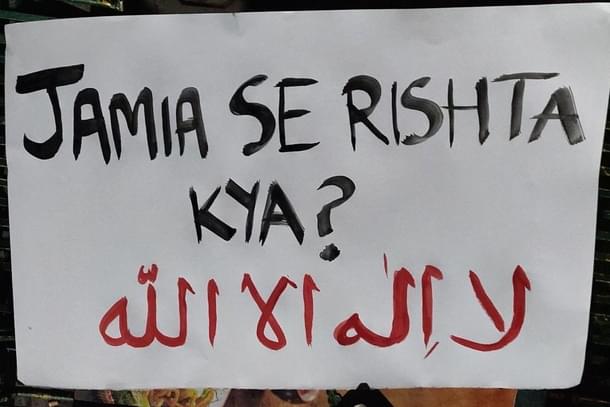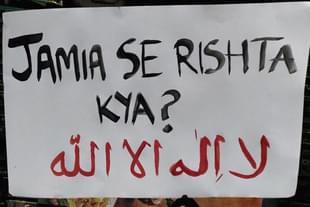Politics
How Do Minorities Of A Minority Institution Feel When Surrounded By ‘Allahu Akbar’ And ‘La Illaha Illallah’ Chants?
Swati Goel Sharma
Dec 28, 2019, 12:26 PM | Updated Dec 30, 2019, 01:07 PM IST
Save & read from anywhere!
Bookmark stories for easy access on any device or the Swarajya app.


“La Ilaha Illalaha, Muhammadan rasul ullah ”, accompanied by chants of ‘Allahu Akbar’ and ‘Naare-e-Takbeer’, was repeatedly raised at the recent anti-Citizenship Amendment Act (CAA) protests that erupted at the Aligarh Muslim University (AMU) and Jamia Millia Islamia (JMI) University — the two largest minority-run institutions of India that are funded by the Government of India.
In Aligarh-located AMU, where students agitated on the evening of 15 December purportedly to oppose a simultaneous police crackdown in New Delhi-located JMI, they were seen chanting, “Jamia se rishta kya, la illaha illallah (what’s our relationship with Jamia? There is no god but Allah)”.
'तà¥à¤°à¤¾ मà¥à¤°à¤¾ रिशà¥à¤¤à¤¾ à¤à¥à¤¯à¤¾, ला à¤à¤²à¤¾à¤¹à¤¾ à¤à¤²à¥à¤²à¤²à¥à¤²à¤¾à¤¹
— Swati Goel Sharma (@swati_gs) December 14, 2019
à¤à¤à¤¼à¤¾à¤¦à¥ à¤à¥à¤¨ दिलाà¤à¤à¤¾, ला à¤à¤²à¤¾à¤¹à¤¾ à¤à¤²à¥à¤²à¤²à¥à¤²à¤¾à¤¹' pic.twitter.com/tQfLT7uvFr
The police had entered the Jamia campus after violence erupted near the university earlier in the day in which protesters hurled stones at the police, set buses on fire and vandalised cars. Police had to use teargas to disperse the violent mob.
In Jamia, videos emerged of students taking out a rally and chanting “Tera mera rishta kya, la illaha illallah.”
Students and staff of both the institutes have Muslims in majority. The slogans have clear Islamist connotations.
‘Allah u Akbar’ means “Allah is greatest”.
‘Naara e Takbeer’ means “the greatest slogan” (that is, Allah u Akbar)
’La Illaha Illallah’ means “There is no god but only Allah”
‘Muhammadan rasul ullah’ means “Muhammad is the messenger of Allah”
These slogans form an integral part of the Muslim socio-religious fabric. They represent the critical essence of the Muslim faith. One cannot be a Muslim unless he confesses to these pillars of faith. And to convert to Islam, it suffices to recite the last two confessions in public in Arabic, also called Shahada or Kalma.
Technically speaking, this Arabic confession of faith is a necessary and sufficient criteria to be a Muslim. Stronger the confession, better the Muslim.
It is thus natural that these and similar slogans that emphasise the commitment to these confessions become the foundation of any display of loyalty to Islam.
These slogans have a positive connotation when it relates to the level of commitment to the faith. However, in a pluralistic society they also get presented with an exclusivist-negative connotation.
Saying ‘Allah alone is greatest’, can be interpreted as implying that other concepts of god are inferior. Saying there is no god but Allah, can imply that all other faiths except Islam are false. In fact, this is how radical organisations exploit these slogans to showcase their terrorist activities as utmost commitment to Islam.
‘Allahu Akbar’ is routinely employed by Islamist extremists before a terrorist attack across the world. As per reports, a four-page document found in the luggage of suspected hijack ringleader of 9/11, Mohamed Atta, contained a passage that said, “Shout, Allahu Akbar, because this strikes fear in the hearts of the non-believers.”
Between these positive and negative connotations lies a wide range of overt sloganeering to showcase one’s loyalty to the faith as unique, special, and superior to other faiths. In an Islamic society, these ‘other faiths’ may be other sects within Islam.
In a society with a mixed population, these ‘other faiths’ are usually other religions.
In India, there is another aspect to it. India has majority of its population as Hindus who go to temples and worship deities represented as idols. The general as well as expert opinion within the Islamic society treats idolatry as a violation of Shahada. This is called ‘Shirk’ or a major sin.
Thus, display of commitment to Islam and damning of the Hindu faith often become two sides of the same coin. Even Pakistani poet Dr Faiz Ahmed Faiz, considered a communist, could not help comparing destruction of dictatorship of Zia Ul Haq with destruction of idols to establish the rule of Allah. This poem recently caused a controversy in India when recited to oppose CAA and NRC at IIT Kanpur.
How then did the minority groups at AMU and Jamia feel about such sloganeering?
“I felt excluded. I felt that no matter how much I embrace the university and its culture, I wouldn’t be accepted by the majority simply because of my faith,” a post-graduate Hindu student at Jamia told this correspondent, on the condition of anonymity. The 23-year-old completed his graduation, too, from Jamia.
The student added a rider that many Muslim students oppose such sloganeering too, but the aggressors shout them down by shaming them “for not standing up for Islam”.
“The student leaders use faith as a tool to suppress dissent. Non-Muslims don’t have much of a voice anyway. As long as we are silent, nobody touches us. So, naturally, silence has become a survival tool for us,” he said.
The student said that the entire discourse among the student leaders is hinged on religion, Islam that is. “Phrases like ‘qaumi ekta’ and ‘la illaha illallah’ figure repeatedly in their speeches and even informal discussions. We constantly feel alienated. We stay away from such gatherings.”
”That’s precisely what they want as well,” he said.
A Hindu post-graduate law student in AMU said he “doesn’t like” such slogans being raised.
“I feel insecure and even scared. The slogans sound like they are being raised against us,” he said. “But we cannot do anything. You are, perhaps, the first person who has even asked us how we feel.”
However, the student said that he hasn’t heard such aggressive sloganeering in his six years’ stay at the campus. “I completed my school and graduation from AMU. This also implies that it’s not a particularly hostile place for non-Muslims,” he said.
“Nobody touches you as long as you are silent and don’t interfere in their politics.”
The student said that he doesn’t recall such aggressive protests erupting in the campus in the past. “I think slogans like ‘tera meri rishta kya, la illaha illallah’ were publicly shouted for the first time in the campus,” he added.
“We don’t have a JNU-like protest culture.”
“In fact, student leaders here hate the Leftists as the latter are — at least in letter — atheists, whereas the former are self-proclaimed crusaders of Islam,” he said.
“Itna ya to dekha-dekhi mein hua ya inhe instigate kiya gaya [protests of this scale were done either as imitation or they were instigated],” the student said.
Another post-graduate law student at AMU, again talking anonymously, said that while the university has a “very obvious Islamist atmosphere”, the recent sloganeering has made many non-Muslim students uncomfortable and nervous.
“On that [15 December] evening, we were at our homes and frantically exchanging messages and videos that were emerging from the campus. All of that felt like a threat issued to us,” he said.
“If it was about police’s supposed high-handedness in Jamia, their protest should have been about the sanctity of campuses and reputation of students. But it was only about the qaum. Their Muslim community,” he said.
The student shared some of that WhatsApp exchange with this correspondent. The WhatsApp group, titled ‘Nationalist’ had only non-Muslim students as members, he said.
“Dogle bolte hain. Dharm nirpeksh ke liye dharna hai. Aur chilla chilla kar bol rahe hain Naara E Takbeer Allahu Akbar [It’s double-speak. They are claiming to be fighting for secularism but shouting Naara E Takbeer and Allahu Akbar),” a message said.
The students shared some digital pamphlets prepared by protesters that were circulated in student WhatsApp circles and Facebook pages during the protests.
A pamphlet dated 16 December and signed by Salman Imtiaz, president of AMU students’ union, says,
“...We demand AMU vice chancellor and the Registrar must immediately resign or else they will have to face protests or social boycott from the community for being partner in police oppression...”
A student told this correspondent, “Forget fellow students, they use religion to bully the administration as well.”
Another pamphlet dated 22 December, issued by “Office Of The Students” of AMU, said,
“…by the collective authority of the students, the teaching faculty and the non-teaching staff of the university, the incumbent Vice-Chancellor Prof. Tariq Mansoor and Registrar Mr S Abdul Hamid are hereby EXPELLED from their respective positions. Through this, we notify them to vacate the VC Lodge and Registrar’s lodge till January 5, 2020….”
The student said that this is a well-rehearsed tactic exploited by student leaders: one, accuse the administrators of going against the community and, two, circulate damning material to bring down their status in the eyes of the larger student community.
“This ‘office of the students’ is an informal group with, obviously, no powers to remove university heads from any post. The digital pamphlet was meant to demean and bully them,” he said.
A Jamia student shared some social media posts made by anti-CAA advocates in the campus.
A video posted by a page named Students of Jamia and some posts by Jamia students, say,
“Tera mera rishta kya?? Jamia ka maqsad kya?? Jamia se rishta kya?? AMU ka maqsad kya?? AMU se rishta kya? Kashmiriyon se rishta kya?? Philistineen se rishta kya?? Iraq, syria, afghanistan, rohingya, uyghur se rishta kya?? Babri Masjid se rishta kya?? Assam k musalmano se rishta kya??!! Hyderabad k musalmano se rishta kya?? Sirf La ilaha illallah Muhammadur Rasulullah (Sic).”.
A video shows students chanting a similar poem. On a student WhatsApp group, a message says,
“Guys hum inshallah bill ko wapis karenge ya change karenge ya jihad karenge.”
In reply, another message says:
“Ok jihad mein hum bhi aapke saath hain.”
The student said that such is the constant pressure on the staff and the administration that during Ramzan, Muslims students brazenly refuse to submit assignments citing fasting.
“Most teachers are anyway lenient on students practising religion, but even the strict ones dare not turn down such demands or they are labelled anti-Islam,” he said.
“On the other hand, no Hindu student will be offered any leniency if he gave any excuse relating to his religion,” he said.
(The students spoke on the condition of anonymity. This correspondent has audio recording of all the conversations with consent)
Swati Goel Sharma is a senior editor at Swarajya. She tweets at @swati_gs.





